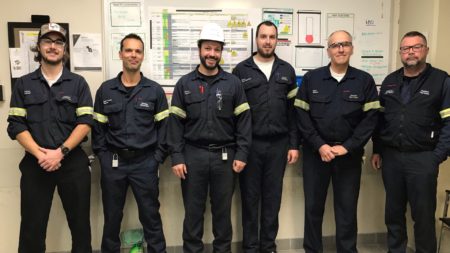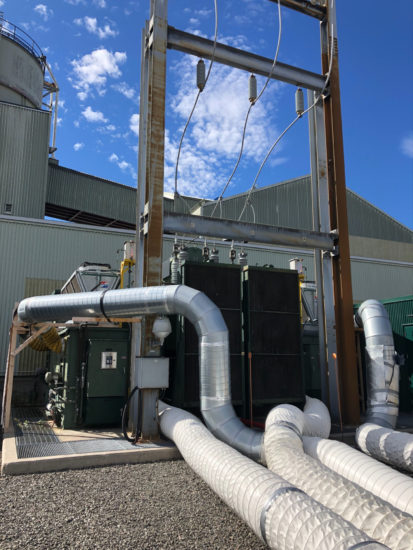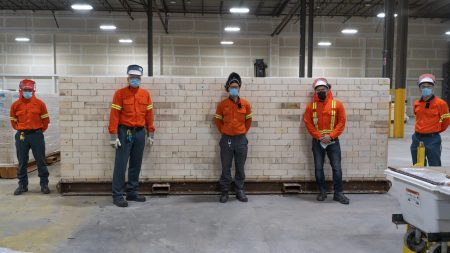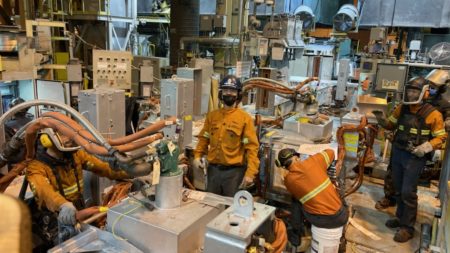Teams Join Forces at Laterrière Works

L'équipe ayant contribué au succès de l'opération:
Voici le nom des gens sur la photo de gauche à droite : Dannick Gauthier, Jean-François Martel, Simon Lessard, Simon paré Desjardins, Jules Simard et Frédéric Tremblay.
Last April and May, major work took place at the Laterrière High-Voltage Sector. Workers from independent trades were brought in to help the plant team, which had been struggling with increased outages that compromised aluminium production. Racing against the clock, workers from Power Operations, Asset Management, Hitachi and Laterrière Works joined forces to get the plant back up and running as fast as possible.
Two major incidents struck practically at the same time. First, in early April, the high-voltage rectifiers showed signs of overheating. They really needed to be cooled down before the summer heat arrived, otherwise, the current in potrooms would need to be reduced to prevent the equipment from getting too hot.
This issue was known, but it had become more of a concern given the increased equipment breakdowns. “Daily production at Laterrière Works was down due to the outages, and it was too risky to continue operating with this level of power,” said Hugo Simard, Electrical Engineer, Asset Management for Quebec Operations. “We had to lower the current. But that also means reduced production.”
“We set up a crisis group with people from Power Operations, Asset Management, Engineering and Laterrière Works to find ways to cool down the rectifiers. We had to stabilize the rectifiers for the duration of the work, to make sure that we would have time to complete the entire refurbishment project,” said Guillaume Villeneuve, Reliability Engineer, Asset Management for Quebec Operations.
In record time, eight massive air conditioners were installed on the high-voltage rectifiers throughout the operations at the plant, which remained in service. Within five weeks, the units were delivered to the site, installed and up and running.

“This is outstanding work and a matter of great pride as far as efficiency and effectiveness of execution go. At first, we didn’t know what to do. We came up with about twenty solutions and worked on them independently, trying to find which one was more feasible by summer,” said Mr. Villeneuve.
“The plant was at high risk of an outage, which meant we could lose a potroom. For an aluminium plant, losing a potroom is one of the worst outcomes. That’s why all teams worked tirelessly to avoid a breakdown. Everyone pitched in to help Laterrière Works,” said Mr. Simard.
Then, the day before turning on the air conditioners, the second incident occurred, when the transformer that powered the rectifiers broke down. An internal electrical defect prevented it from restarting. The project had to be put on hold.
The first step was performing specialised diagnostics to determine the nature of the failure. Experts from Power Operations and Hitachi worked as a team to perform the tests and share the results. The collaboration was extremely professional. Unsure of the best way to resume operations, Laterrière Works was on high alert.
“The challenge was finding out whether the transformer could be repaired on site or not. For the first three days, we didn’t know if we had to bring it out and ship it by train or truck to Sherbrooke, or even build a workshop on site with a pressurised hangar. This kind of handling is as delicate as open-heart surgery. It was very stressful for the plant operators. Shipping out the transformer to get it repaired would have taken three to four months,” said Mr. Villeneuve.
Fortunately, the transformer was repaired on site in only 12 days—an impressive achievement, as this type of work usually takes 35.
Mr. Simard added: “The operators had to be very active. This work had a major impact on them. To fit in the repair work, they had to be there early in the morning until the evening, and on weekends.”
“Seeing all the expertise we had on site was truly incredible. Everyone worked as one big team, as time was of the essence,” said Mr. Villeneuve. “Hitachi and Power Operations provided transformer repair specialists, Laterrière Works oversaw the operations and ensured that everything was running smoothly, and the Asset Management team made sure no stone was left unturned and prepared all the groundwork in advance.”


